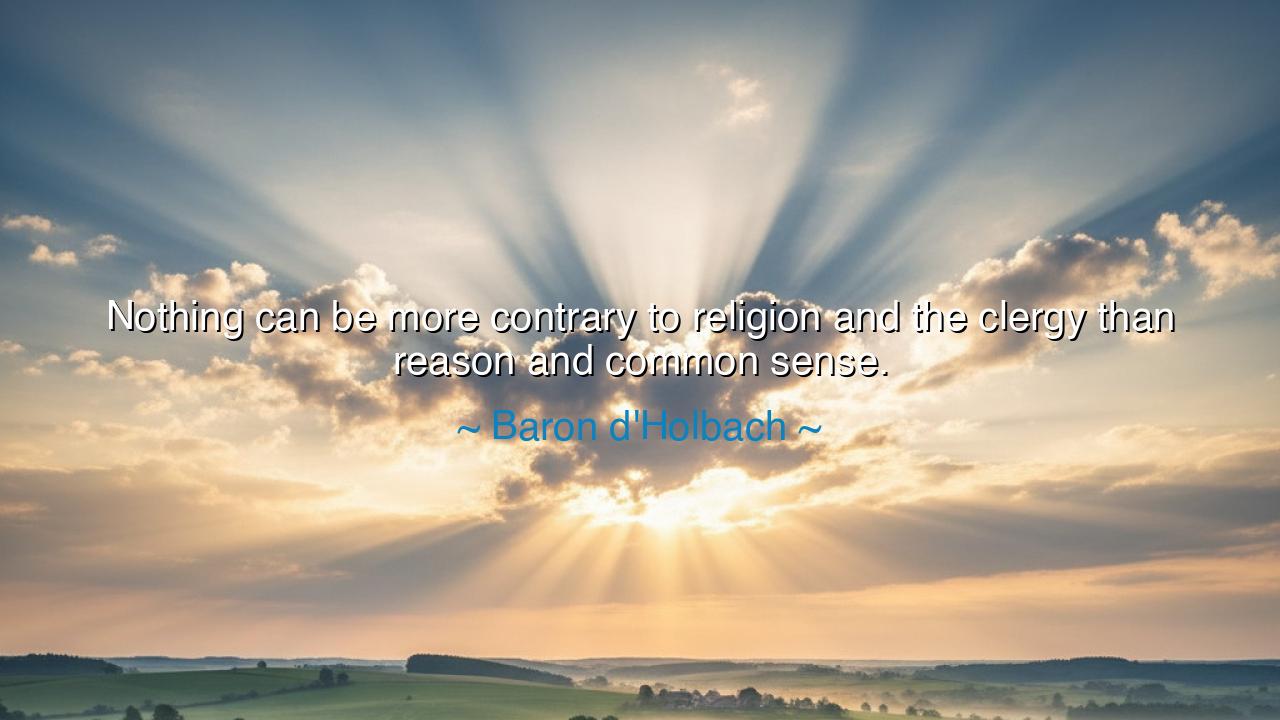
Nothing can be more contrary to religion and the clergy than






Hear the fiery words of Baron d’Holbach, a thinker of the Enlightenment, who declared: “Nothing can be more contrary to religion and the clergy than reason and common sense.” These are not gentle words but a sharp blade, forged in an age when men dared to question altars, kings, and sacred traditions. They are born from a time when the human mind sought to free itself from the yoke of authority, when philosophers challenged the mighty powers of priests and monarchs alike. D’Holbach spoke as one who believed that the chains upon humanity were not of iron, but of superstition, woven by those who claimed to speak for heaven.
The origin of this saying lies in the spirit of the eighteenth century, in the salons of Paris where the voices of reason rose like a storm. D’Holbach, an avowed atheist, saw in organized religion not guidance, but oppression. To him, the clergy were guardians not of truth, but of ignorance. For where reason questioned, religion demanded silence; where common sense observed, religion declared mystery. Thus, he declared the two irreconcilable: a gulf between the freedom of the mind and the dictates of dogma.
History offers us many examples of this clash. Recall the trial of Galileo Galilei. With his telescope he gazed upon the heavens and found that the earth was not the center of creation. This was reason and common sense at work, the mind of man aligned with the evidence of the stars. Yet the clergy, bound to old doctrines, condemned him, forcing him to recant under threat of punishment. In that moment, d’Holbach’s words seemed to ring true: that reason, when it shines, becomes a rival to authority built upon faith.
And yet, O listener, let us be wise and not too quick to take sides. For there have also been saints, monks, and scholars who cherished both faith and intellect. Thomas Aquinas sought to reconcile Aristotle with Christian doctrine. The great Islamic philosophers of Cordoba preserved and expanded upon the wisdom of the ancients. Even within religion itself, there have been those who refused to cast away common sense, who saw no war between God and truth. D’Holbach’s words remind us not of the impossibility of unity, but of the danger when religion and clergy fear the light of questioning.
The power of his saying lies in its challenge: that any system, sacred or secular, which forbids the use of reason becomes an enemy to human flourishing. To forbid common sense is to ask men to betray their own eyes, to deny what they know within their own hearts. When this happens, tyranny is not far behind, for those who silence the mind can enslave the body. D’Holbach’s voice, therefore, is not only a cry against religion, but a cry for liberty of thought in all its forms.
The lesson is clear: you must cherish the gifts of reason and common sense as treasures no authority should strip from you. Question boldly. Test what you are told, whether by priest, philosopher, or politician. Do not cast away faith if it comforts you, but never let it become a chain that binds your judgment. For truth fears no examination, and what is real will stand even after the fires of reason have burned away all that is false.
Therefore, child of tomorrow, take action. Read widely, question bravely, and honor the evidence of your own eyes and mind. Do not despise tradition, but do not worship it blindly. Let your faith, if you hold one, be strengthened by honesty rather than weakened by fear of inquiry. In this way you will live as a free soul, guided not by the commands of others, but by the eternal lamp of reason that burns within you.






AAdministratorAdministrator
Welcome, honored guests. Please leave a comment, we will respond soon